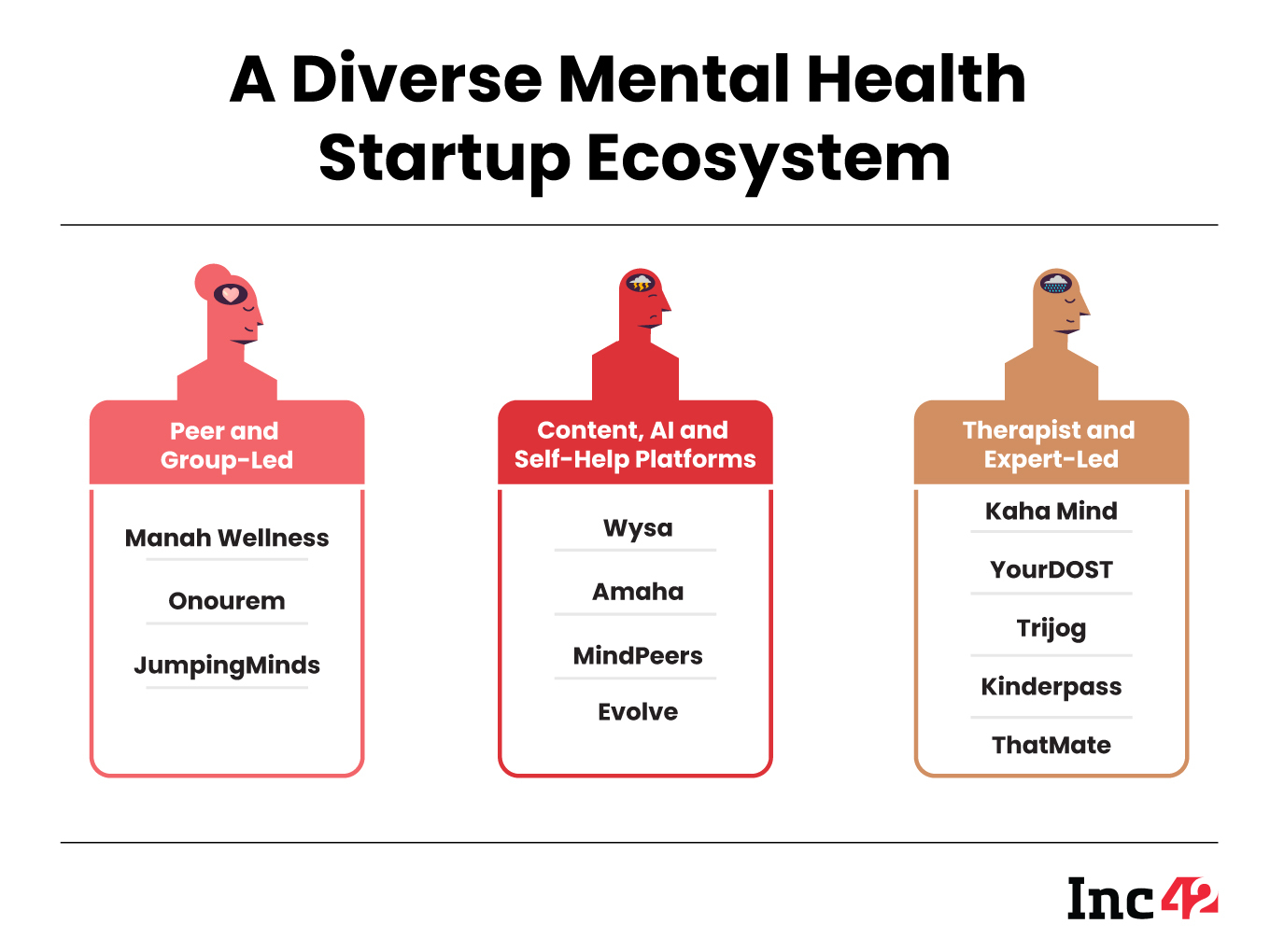VC firm Blume Ventures pegs the potential market size of the Indian mental healthcare industry at around $3 Bn
Startups such as Wysa, Evolve, Kaha Mind, MANAH, Trijog and Amaha are looking to build innovative tech-led solutions to combat mental health issues
An acute shortage of mental health professionals, lack of digitised health records and stigma are still key constraints that mar the growth of mental health startups in India
The numbers around mental health and wellness in India don’t lie. Officially, 1.64 Lakh Indians died by suicide in 2021 and the national suicide rate was around 12 per lakh of the population.
This is well above the global average of 9 per lakh and the regional average of 10.2 per lakh. Is this an aberration given India’s high population or is this just a story about how backwards India is when it comes to mental health awareness and access to resources?
For instance, the Indian Psychiatric Society noted that a mere 12% of respondents in the country had ever heard of depression, and even the government’s budgetary allocation for mental health stood at a mere 1% of the total health budget at just INR 919 Cr.
That sum has been earmarked for a country which is home to more than 5.6 Cr people suffering from depression and another 3.8 Cr suffering from anxiety disorders — and that’s the data from the National Mental Health Survey in 2019, or pre-pandemic.
One could say that the pandemic not only brought a sharp focus on physical health but showed Indians just how accessible getting the right help has become. The telemedicine push lifted India’s mental health tech startups as well, with new and experienced entrepreneurs joining the mental wellness rush.
A Big Untapped Market
While mental health awareness and jargon had already permeated through pop culture, the pandemic crystallised the need to look inwards.
In many ways, the pandemic changed how mental wellness is perceived as even those who might have considered it a stigma began considering it seriously. The toll of the lockdown, the travel and movement restrictions and the very real fear of Covid shook many doubters from their seats.
For instance, a study by KFF.org in February 2021 found that rising cases among individuals related to sleeping issues (36% higher) or eating disorders (32% higher).
Even businesses were taking mental health seriously and instituting policies to ease the adjustment to remote working. Many even brought in counselling sessions to help employees address any issues they may be facing.
Of course, almost all of this was happening online, which led to the boom of mental health platforms and AI-led apps and this also brought the spotlight on the commercial opportunity. And that holds true even for entrepreneurs who moved to the mental wellness space to build a business around doing good.
Blume Ventures pegged the Indian mental health care industry – online and offline – as a roughly $3 Bn opportunity in its October 2022 report.
And the game has changed significantly in the last year, making mental wellness distribution and delivery far easier for many startups. The emergence and application of generative AI standards has the potential to personalise wellness courses and content, while reducing the content creation dependency and burden on startups.
This makes it easier to reach a lot more users that would have otherwise found mental wellness and therapy inaccessible or unaffordable.
Mental Health Startups Take Diverse Routes
The Indian mental wellness startup landscape includes well-funded players such as Wysa, LISSUN, Shyft (formerly Mindhouse), Sukoon, Innerhour, Trijog, YourDOST, Mitsu among others that have raised capital in the past couple of years.
While the opportunity is undoubtedly large, mental health and wellness startups have taken vastly different go-to-market strategies and product propositions to get there.
Many of them are not new, but came to prominence during the pandemic years, which changed their GTM strategies quite a bit and made them rely heavily on tech.
One of the exciting things about the mental health space is that companies have the flexibility to choose these hybrid approaches since the problem is multifaceted — they need to create awareness and build a captive audience but without compromising on outcomes.
Mumbai-based Trijog has been around since 2015, but only switched to an online-first model in 2020, while earlier it used to see 70% revenue from offline consultations.
Others such as Wysa and Shyft rely completely on digital channels for customer acquisition. These startups work like any other consumer health service, acquiring users through app install campaigns and developing product features.
Backed by Google, pi Ventures, Kae Capital and others, Wysa has raised close to $30 Mn till date. It claims to have held more than 500 Mn AI chat conversations with more than 5 Mn individuals across 95 countries since inception. It was named Google’s Best App of 2020 and became Google Assistant fund’s first investment in India.
Bengaluru-based Wysa claimed to have witnessed a 94% growth in new users from February to June 2020, while Mumbai-based Trijog claimed 60% revenue growth in that period.
Yet other startups have opted for a hybrid strategy. Founded in 2014, YourDOST leverages social media channels to conduct on-ground awareness campaigns, events and content where it is able to reach individuals directly.

“Through a lot of awareness interventions, content and self-help materials which are ‘free’ on our website, people are able to understand more about themselves and their emotional wellbeing,” YourDOST cofounder Puneet Manuja told Inc42 in August 2020.
Given how central mental health has become to corporate and HR policies, it’s hardly surprising that B2B is another major go-to-market route for startups.
Businesses are looking at tie-ups and partnerships for employee wellness programmes. Trijog founder Arushi Sethi told Inc42 earlier that it works with the likes of Unilever, WeWork, TATA, OML, Soho House, Euro School, Oberoi International School among other organisations.
Mental Wellness In The Age Of AI
The diversity in models extends to new-age mental wellness platforms. LGBTQIA+-focussed Evolve and Kaha Mind largely operate under the ambit of counselling and self-help segments but differ in their approach.
While Evolve is an AI and content-led mental health platform, Kaha Mind puts the impetus on the therapist and expert-led approach.
AI is of course a major buzzword in most tech sectors. In the mental wellness space, the approach is limited to leveraging AI for content when it comes to self-help models, but there can be no replacement for expert-led intervention.
Startups believe that self-help platforms and content can become a key funnel to bring more individuals into one-on-one or group therapy sessions and get hands-on help.
The blended model of AI chatbots backed by mental health professionals is becoming increasingly common as it targets first-time users as well as those who have sought professional help in the past.
The opportunity to innovate with wellness models, go-to-market strategies, technology intervention and the sheer size of the Indian market means that investors have no dearth of options when it comes to attractive ventures. Models are still evolving and talk about revenue is still early as the customer base is yet to mature enough.
Among recent examples, Sukoon bagged $15 Mn in funding last November, while mental health platform LISSUN bagged $1.3 Mn in its seed round led by Inflection Point Ventures and Rainmatter Capital in September 2023.
Despite the large opportunity, startups are still early in terms of maturity, particularly given that healthtech by itself has yet to mature beyond epharmacies dispute the telemedicine promise.
Overall, the segment is still relatively unexplored by investors. As per Tracxn, India is currently home to around 280 mental health startups, which have raised capital in excess of $53 Mn to date.
There’s little doubt that professional mental wellness will move more towards tech in the near future especially as AI-generated content creates a critical mass of users for mental health tech startups.
It’ll be interesting to see which mental health startup manages to break through and catalyse the Indian market.
































 Ad-lite browsing experience
Ad-lite browsing experience